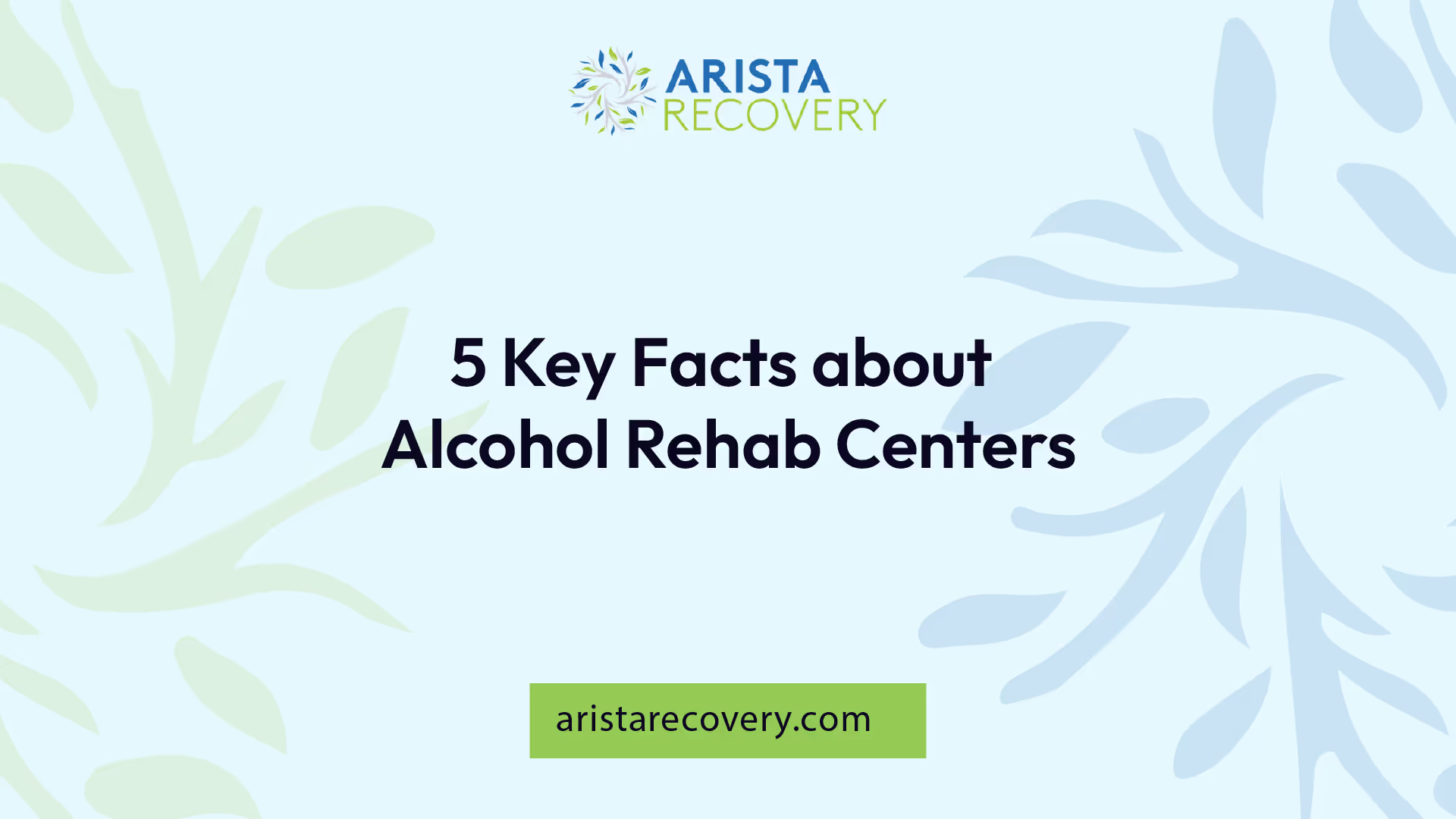5 Key Facts about Alcohol Rehab Centers


Understanding Addiction Recovery
Addiction recovery encompasses a wide range of processes and experiences individuals undergo to overcome substance abuse and regain control of their lives. This section will explore relevant statistics to better understand the landscape of addiction recovery in the United States.
America's Addiction Recovery Statistics
In recent years, there has been a notable increase in the demand for addiction recovery services. In 2020, SAMHSA's National Helpline received 833,598 calls, which marked a significant 27 percent increase compared to 2019, when there were 656,953 calls. This surge illustrates the growing awareness and acknowledgment of substance abuse issues across the country.
YearCalls Received to SAMHSA Helpline2019656,9532020833,598
Success Rates in Addiction Recovery
Success rates in addiction recovery programs can provide insights into the effectiveness of treatment options available. According to SAMHSA, approximately 68% of individuals who complete drug and alcohol detox programs report their treatment as successful [2]. This statistic highlights the potential effectiveness of structured detox programs for those seeking recovery.
Treatment TypeReported Success Rate (%)Drug & Alcohol Detox68
Therapy remains a fundamental component of addiction recovery and is utilized at every stage of treatment and recovery support [2]. Understanding these statistics can help individuals and families make informed decisions about seeking help and navigating the journey through recovery.
Alcohol Rehab Center Options
Understanding the various options for alcohol treatment programs can significantly impact a person's recovery journey. This section will explore the different types of alcohol rehab programs available and the factors that influence the duration of these programs.
Types of Alcohol Treatment Programs
Alcohol rehab centers typically offer several types of treatment programs. Each is designed to accommodate different needs and preferences. Some common types include:
Type of ProgramDescriptionInpatient RehabRequires individuals to reside at the facility for a certain period. Common durations include 30-, 60-, and 90-days, though this can vary based on personal circumstances.Outpatient RehabAllows individuals to attend treatment sessions while living at home. This option offers more flexibility and is generally less expensive than inpatient care.Partial Hospitalization Programs (PHP)Combine aspects of both inpatient and outpatient treatment, providing structured programs while allowing individuals to return home at the end of the day.Intensive Outpatient Programs (IOP)Offer more support than standard outpatient therapy, often involving several hours of treatment per week.
Accessibility to different programs allows individuals to choose the path that best fits their lifestyle and needs.
Factors Influencing Rehab Duration
The duration of stay in alcohol rehab centers can vary widely based on several factors. Research indicates that longer stays are often associated with higher success rates [3]. Important factors influencing rehab duration include:
FactorInfluence on DurationSeverity of AddictionIndividuals with severe alcohol use disorders may require longer treatment episodes.Previous TreatmentThose with prior rehab experiences may need extended care to address ongoing struggles.Co-occurring DisordersThe presence of mental health issues may necessitate a more extended therapeutic approach.Support SystemsIndividuals lacking strong support systems may benefit from longer stays to build stability.
According to the National Institute on Drug Abuse, treatment for less than 90 days is often ineffective, advising that longer treatment periods are generally more beneficial [3]. Recovery from alcohol use disorder is a long-term process that may involve multiple treatment episodes [3]. This highlights the importance of not only the duration of treatment but also the comprehensive nature of the programs involved.
Effectiveness of Treatment Programs
Understanding the effectiveness of treatment programs is vital for those considering alcohol rehabilitation. Two key components play a significant role in these programs: therapy and aftercare.
Therapy in Addiction Recovery
Therapy serves as a foundational element in addiction recovery programs. Various types of therapeutic approaches are employed to address both substance use disorders and any underlying mental health issues. These therapies include cognitive behavioral therapy (CBT), group counseling, and individual therapy, all working together to help individuals identify triggers and develop coping strategies.
Studies show that the success of treatment can often hinge on the therapeutic support provided during rehabilitation. It is reported that less than 43% of individuals who enter treatment for drug and alcohol use actually complete the treatment, highlighting the importance of effective therapy to encourage completion and, subsequently, long-term recovery.
Type of TherapyDescriptionCognitive Behavioral Therapy (CBT)Focuses on changing negative thought patterns.Group CounselingProvides peer support and shared experiences.Individual TherapyOffers personalized attention to address specific issues.
Importance of Aftercare Programs
Aftercare programs are essential for maintaining sobriety after completing a rehabilitation program. These programs provide ongoing support and resources to help individuals navigate the challenges they may face in everyday life. Approximately 84% of treatment facilities offer aftercare services to assist individuals post-rehabilitation. Aftercare can include support groups, counseling, and regular check-ins, all crucial in preventing relapse.
Research shows that continued care following treatment significantly boosts recovery outcomes. For instance, individuals who receive comprehensive treatment while incarcerated and follow that with continued care after release experience reductions in drug use and criminal activity [4]. Implementing aftercare creates a structured environment in which individuals can thrive in their recovery journey.
Aftercare Service TypeBenefitsSupport GroupsOffers community and shared experiences.CounselingProvides ongoing therapeutic support.Regular Check-InsHelps track progress and address challenges.
Together, therapy and aftercare programs create a strong framework for effective addiction recovery, enhancing the chances of long-term sobriety and improved quality of life.
Specialized Rehab Programs
Specialized rehab programs are designed to address the unique challenges faced by different demographic groups in their recovery journey. These tailored programs focus on the specific needs of individuals, taking into account factors such as age, profession, and life experiences.
Tailored Programs for Different Demographics
Programs like those offered by Fusion Recovery provide specialized treatment for demographics including teens, veterans, and professionals. Each group faces distinct challenges, such as:
DemographicUnique ChallengesProgram FeaturesTeensPeer pressure, varying emotional maturityPeer group therapy, educational supportVeteransPTSD, reintegration into civilian lifeTrauma-informed care, assistance with VA benefitsProfessionalsCareer maintenance, confidentiality concernsExecutive coaching, flexible scheduling
These programs integrate holistic strategies to ensure that the treatment is not only effective in addressing substance use disorders but also supportive of co-occurring mental health issues.
The Role of Therapy in Rehabilitation
Therapy plays a critical role in the rehabilitation process. Specialized rehab centers like Fusion Recovery provide a comprehensive range of therapeutic modalities tailored to the needs of their clients. These include:
The goal is to equip individuals with the tools needed to navigate their recovery and maintain long-term sobriety. The inclusion of therapy options ensures a holistic approach to treatment, addressing both substance use and mental health to promote overall well-being.
Ultimately, individualized treatment addressing demographic-specific challenges, coupled with effective therapeutic methods, significantly enhances the chances of successful recovery for individuals facing addiction.
Individualized Treatment Approaches
Evidence-Based Therapies for Addiction
In the realm of addiction recovery, individualizing treatment approaches is essential. Evidence-based therapies form a core component of effective treatment programs. These therapies include structured interventions that are grounded in scientific research and clinical practice. Popular evidence-based approaches encompass cognitive behavioral therapy (CBT) and motivational interviewing.
Type of TherapyDescriptionEffectivenessCognitive Behavioral Therapy (CBT)Focuses on changing negative thought patterns and behaviors related to addiction.High; three out of four participants report improvements.Motivational InterviewingEncourages individuals to find their own motivation to change their addictive behaviors.Effective in promoting engagement and commitment to treatment.
According to Rehab Spot, integrating psychotherapy—commonly referred to as talk therapy—further enhances the addiction treatment process. This method can coexist with alternative therapies and has shown significant improvements in about 75% of participants. The combination of these methods creates a comprehensive therapeutic experience tailored to individual needs.
Innovative Therapeutic Techniques
In addition to traditional evidence-based therapies, rehabilitation centers often employ innovative therapeutic techniques designed to complement the recovery process. These alternative therapies can include options such as art therapy, music therapy, acupuncture, yoga, and recreational therapy, all aimed at addressing different aspects of recovery and personal growth.
Another notable approach is biofeedback therapy. This technique emphasizes the mind-body connection, enabling individuals to learn control over their body's involuntary responses, such as heart rate and blood pressure. It has shown benefits for conditions like stress, migraines, chronic pain, and PTSD. These innovative practices enrich the treatment landscape, offering diverse pathways for recovery that resonate with individual preferences and needs.
The diversity of therapeutic techniques improves the likelihood of successful recovery from addiction, catering to various personal preferences and psychological profiles. Integrating both evidence-based and innovative therapeutic strategies creates a more holistic treatment experience for those on the road to recovery.
Factors Impacting Treatment Success
Understanding the elements that affect treatment success is crucial for individuals seeking help in alcohol rehab centers. Key aspects include the duration of rehab stays and the choice between inpatient and outpatient programs.
Benefits of Longer Rehab Stays
Research indicates that longer periods spent in alcohol rehab are associated with higher success rates. Studies suggest that treatment durations of 90 days or more can be more effective than shorter programs. These extended stays provide individuals with the opportunity to address the root causes of their addiction, explore contributing factors, and develop better coping mechanisms.
Duration of RehabSuccess Rate (%)Less than 30 days30%30-60 days40%60-90 days50%90 days or more70% or higher
According to the National Institute on Drug Abuse (NIDA), treatment for fewer than 90 days has limited effectiveness and extended durations are highly recommended [3].
Inpatient vs. Outpatient Rehab Programs
When considering treatment, individuals often face the decision of choosing between inpatient and outpatient rehab programs.
Program TypeKey FeaturesIdeal ForInpatient Rehab24/7 support, structured environmentSevere addiction, safety concernsOutpatient RehabFlexible schedules, home-based careMild addiction, strong support networks
Research shows that less than 43% of individuals who enter treatment for drug and alcohol use complete the program [4]. Selecting the appropriate program type and ensuring a longer duration in rehab can significantly enhance the likelihood of successful recovery.
References
[2]:
[3]:
[4]:
[5]:
[6]:
[7]:
[8]:
You’re not alone in this.
When mental health challenges and addiction intersect, it can feel isolating. At Arista, we offer compassionate, evidence-based, and trauma-informed care to help you heal, grow, and move forward.
You’re not alone in this.
When mental health challenges and addiction intersect, it can feel isolating. At Arista, we offer compassionate, evidence-based, and trauma-informed care to help you heal, grow, and move forward.
Support that moves with you.
You’ve taken a brave first step. At Arista Recovery, we’re here to help you continue with best-in-class care designed for long-term healing and support.
.webp)






